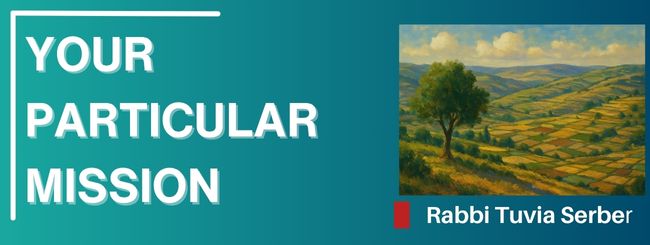בס”ד
Parashat Pinchas
Parashat Pinchas In this week’s Torah reading called Pinchas, we find the order of inheritance and the division of the Land of Israel between the different tribes. This idea has an important lesson in the service of G-d .life.
Parshat Pinhas: Your Particular Mission
One of the striking novelties in this week’s Torah reading, Pinhas (named for Aaron’s grandson), is the entire order of inheritances. The portion does not deal only with a person’s property—who receives it when he passes away, whether it goes first to sons and, if there are no sons, to daughters, and so on. It also details how the Land of Israel itself was divided among the various tribes, the actual people who entered the Land.
The Torah is never merely a book of stories; each narrative must carry a teaching for daily life. What lesson lies inside this seemingly technical description of apportioning the Land?
The Inner Meaning of “Eretz Yisrael”
Our Sages ask why the Promised Land is called Eretz Yisrael. The Hebrew word eretz (land) is linguistically linked to ratz—ratzon, will. Thus, Eretz Yisrael represents each person’s desire (or lack thereof) to fulfill G-d’s will.
To “live in the Land of Israel” on a spiritual level means to live in a state where one actively wants to carry out G-d’s wishes. You can be thousands of miles away geographically—say, in Argentina—and still be “in Israel” in this sense if your will is aligned with His.
A Story from the Third Chabad Rebbe
The third Rebbe of Chabad, Rabbi Menachem Mendel Schneerson / Tzemach Tzedek once had a devoted chasid who desperately wanted to move to the Land of Israel. Living in Russia in the 1800s, he repeatedly begged the Rebbe for a blessing to go. The Rebbe consistently refused.
Finally, when the chasid pressed again, the Rebbe answered him in Yiddish:
“Mach doh Eretz Yisroel.”
Make here, in the place where you are, the Land of Israel.
In other words, wherever you are, live on the level of Eretz Yisrael—live with the yearning to fulfill
G-d’s will. That is what the Land truly represents.
Why the Land Was Divided by Lottery
When the Torah describes the division of the Land of Israel, it says it was done by lottery. Each tribe received its portion through what seems an irrational process: completely random territory allocations.
Now, serving G-d in general is the opposite of random. A person usually grows methodically: start with the easiest mitzvot, then learn more, practice more deeply, and so on. It is a highly rational, orderly path, not “do whatever you want.” So why does the Torah teach that our “service of G-d”—symbolized by Eretz Yisrael—was apportioned by lottery?
General Obligations vs. Your Particular Mission
Everyone shares a general workload:
- Jews have (as the speaker puts it) 630 commandments; non‑Jews have the seven Noahide laws and their details. One needs a knowledgeable teacher to learn what to do, when, and how.
But each person also has a unique assignment—a mission no one else can fulfill. How do you know what that special task is?
Look at the areas that are hardest for you.
If you struggle with anger, that is likely your territory to conquer. If faith feels shaky, that is where you must strengthen yourself. The very difficult is proof that this is your allotted portion in G-d’s Land.
“Lottery” Means G-d Chose Your Territory
Just as the tribes did not pick their plots, you do not choose your personal mission, nor does your rabbi assign it. G-d hands it to you—seemingly “irrationally,” like a lottery ticket—and therefore He also grants the strength to accomplish it.
Even if the task feels impossible, remember: a G-d who demanded the truly impossible would be cruel. “Go fly to wherever.” I’m human; I can’t fly. G-d is not like that. If He assigns it, you can do it.
Take‑Away
What looks like a dry story—the Land of Israel divided by lottery—teaches a profound lesson:
- Search for your personal mission in the very places where spiritual growth is toughest.
- Know with certainty you can fulfill it, because the One who assigned it also empowers you.
So go find your “plot” in Eretz Yisrael—wherever you happen to live—and start cultivating it today.
Talk from Rabbi Tuvia Serber
The above is a representation of the spoken text converted to written text.
© Copyright, all rights reserved. If you enjoyed this article, we encourage you to distribute it further.
Our blogs may contain text/quotes/references/links that include copyright material of
Mechon-Mamre.org, Aish.com, Sefaria.org, Chabad.org, and/or AskNoah.org, which we use in accordance with their policies.
